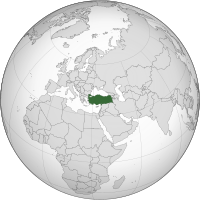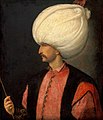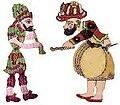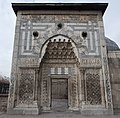Portal:Turkey
Merhaba! Türkiye portalına hoş geldiniz. Hi! Welcome to the Turkey portal.
 | |

| |
Turkey, officially the Republic of Türkiye, is a country mainly located in Anatolia in West Asia, with a relatively small part called East Thrace in Southeast Europe. It borders the Black Sea to the north; Georgia, Armenia, Azerbaijan, and Iran to the east; Iraq, Syria, and the Mediterranean Sea to the south; and the Aegean Sea, Greece, and Bulgaria to the west. Turkey is home to over 85 million people; most are ethnic Turks, while ethnic Kurds are the largest ethnic minority. Officially a secular state, Turkey has a Muslim-majority population. Ankara is Turkey's capital and second-largest city. Istanbul is its largest city and economic center. Other major cities include İzmir, Bursa, and Antalya.
First inhabited by modern humans during the Late Paleolithic, present-day Turkey was home to various ancient peoples. The Hattians were assimilated by the Hittites and other Anatolian peoples. Classical Anatolia transitioned into cultural Hellenization after Alexander the Great's conquests, and later Romanization during the Roman and Byzantine eras. The Seljuk Turks began migrating into Anatolia in the 11th century, starting the Turkification process. The Seljuk Sultanate of Rum ruled Anatolia until the Mongol invasion in 1243, when it disintegrated into Turkish principalities. Beginning in 1299, the Ottomans united the principalities and expanded. Mehmed II conquered Constantinople (modern-day Istanbul) in 1453. During the reigns of Selim I and Suleiman the Magnificent, the Ottoman Empire became a global power.
From 1789 onwards, the empire saw major changes, reforms, centralization, and rising nationalism while its territory declined. The Ottoman entry into World War I was followed by defeat and partitioning. The end of the Ottoman Empire was accompanied by mass displacement and large-scale loss of human life. The Turkish War of Independence resulted in the abolition of the sultanate and the signing of the Treaty of Lausanne. Turkey emerged as a more homogenous nation state. The Republic was proclaimed on 29 October 1923, modelled on the reforms initiated by the country's first president, Mustafa Kemal Atatürk. Turkey remained neutral during most of World War II, but was involved in the Korean War. Several military interventions interfered with the transition to a multi-party system.
Turkey is an upper-middle-income and emerging country; its economy is the world's 17th-largest by nominal and 12th-largest by PPP-adjusted GDP. It is a unitary presidential republic. Turkey is a founding member of the OECD, G20, and Organization of Turkic States. With a geopolitically significant location, Turkey is an emerging power and an early member of NATO. An EU candidate, Turkey is part of the EU Customs Union, CoE, OIC, and TURKSOY.
Turkey has coastal plains, a high central plateau, and various mountain ranges; its climate is temperate with harsher conditions in the interior. Home to three biodiversity hotspots, Turkey is prone to frequent earthquakes and is highly vulnerable to climate change. Turkey has a universal healthcare system, growing access to education, and increasing levels of innovativeness. It is a leading TV content exporter. With numerous UNESCO World Heritage sites and intangible cultural heritage inscriptions, and a rich and diverse cuisine, Turkey is the fifth most visited country in the world. (Full article...)
Selected article -
Dilek Peninsula-Büyük Menderes Delta National Park (Turkish: Dilek Yarımadası-Büyük Menderes Deltası Millî Parkı), established on May 19, 1966, is a national park in western Turkey. It contains within its borders the entirety of the Dilek Peninsula as well as the large delta of the Büyük Menderes River. The park is located in the Kuşadası district of Aydın Province — part of Turkey's Aegean Region. Directly west of the national park is the small coastal town of Güzelçamlı, where several shuttle buses and ferries operate to and from the district's center of Kuşadası, approximately 30 km (19 mi) from the park.
The park is among the most biologically diverse of Turkey's national parks. It is the native and migratory habitat of hundreds of species of birds, mammals, plants, and marine life, some of which are entirely endemic to the park and cannot be observed anywhere else in the world. For these reasons, it is protected by numerous wildlife and wetland conventions, and is of great national and international importance in these areas. (Full article...)
General images
Did you know -
- ... that the Monument of Liberty in Istanbul, the gathering place for the second rally of the Republic Protests, is a memorial for the 31 March Incident that took place in 1909? (May 4, 2007) Wikipedia:Recent additions 139
- ... that Kieran Prendergast was the British Ambassador to Turkey before serving as United Nations Under-Secretary-General for Political Affairs? (June 21, 2008) Wikipedia:Recent additions 220
- ... that Trabzonspor were the first Turkish soccer team entitled to participate in the UEFA Women's Champions League? (September 19, 2009) Wikipedia:Recent additions 248
- ... that Turkish swimmer Derya Büyükuncu is participating at the Summer Olympics for the sixth consecutive time? (July 30, 2012)
- ... that Leyla Güngör scored a goal against Spain in her first game as a member of the Turkey women's national football team? (December 23, 2013)
- ... that the Montreux Convention of 1936 is an international treaty regulating the Dardanelles and Bosporus Straits? (July 8, 2008) Wikipedia:Recent additions 221
- ... that Turkish painter İbrahim Balaban's talent was discovered in prison by fellow inmate and famous Turkish poet Nâzım Hikmet Ran, who called him "my peasant painter"? (May 10, 2014)
Selected picture
Selected biography -
Tuncay Şanlı (Turkish pronunciation: [tunˈdʒaj ˈʃanɫɯ]; born 16 January 1982), often known mononymously as Tuncay, is a Turkish former footballer.
He naturally played as a striker, but was also positioned as an attacking midfielder and on either wing. He was in the Turkey team that finished in third place in both the 2003 Confederations Cup and the 2008 European Championships. With 22 international goals in 80 caps, he is Turkey's third-highest scorer of all time, and tenth-most capped player. (Full article...)
Selected video -
Selected quote -
| “ | A satiated man doesn't know what's hunger, a healthy man doesn't know what's disease. | ” |
Recognized content
Provinces
Related portals
Religions in Turkey
Neighbouring countries
Countries with related heritage
WikiProjects
Turkish wikipedia
 |
There is a Turkish version of Wikipedia, the free encyclopedia. |
Wikimedia
The following Wikimedia Foundation sister projects provide more on this subject:
-
Commons
Free media repository -
Wikibooks
Free textbooks and manuals -
Wikidata
Free knowledge base -
Wikinews
Free-content news -
Wikiquote
Collection of quotations -
Wikisource
Free-content library -
Wikiversity
Free learning tools -
Wikivoyage
Free travel guide -
Wiktionary
Dictionary and thesaurus









































































































